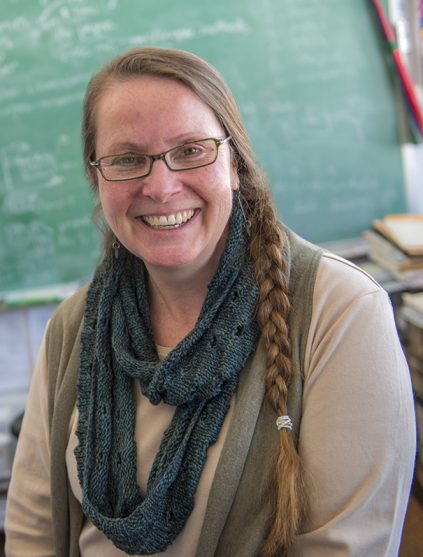Jean MacRae
Research Interests:
- Microbial processes that affect pollutant and nutrient cycling (Biogeochemistry of nutrients and trace elements – arsenic, uranium, acid rock drainage, nitrogen, hydrocarbons – in water and soil)
- Microbial Community Ecology (influence of temperature and pH on lobster shell microbiome and susceptibility to shell disease; bacterial-nematode-ant interactions and potential development of biological control for invasive ant species)
- Sustainability issues in water, resource utilization and development (Resource and materials management. Energy extraction from and beneficial reuse of organic materials such as food waste, wastewater treatment residuals and agricultural wastes; Sustainable water and wastewater systems for the developing world)
Research Projects:
- Integrated Assessment of Alternative Management Strategies for PFAS-contaminated Wastewater Residuals (WRRI 2021)
- Materials Management in Maine
Resources:
- Less waste, but is it safe? Anticipating risks in food waste recovery (Mitchell Center feature, February 2021)
- Presentation: 2017 Maine Sustainability & Water Conference
Degrees:
- Ph.D. in Civil Engineering, University of British Columbia Vancouver, B.C., Canada, 1997
- M.S. in Microbiology, University of British Columbia Vancouver, B.C., 1991
- B.S. in Life Sciences, Queen’s University, Kingston, Ontario, Canada, 1988
Courses Taught:
- CIE 331: Fundamentals of Environmental Engineering
- CIE 434: Wastewater Process Design
- CIE 439: Air Pollution and Solid Waste
- CIE 534: Environmental Microbiology
- CIE 537: Water Pollution
- GEE 250: Sustainable Solutions for the Developing World
Profile:
Jean MacRae is an environmental microbiologist and environmental engineering faculty member in UMaine’s Department of Civil and Environmental Engineering. In addition to teaching environmental engineering topics such as introductory environmental engineering, wastewater treatment, air pollution and solid waste management, she does research on biological remediation and the roles of microbes in nutrient (mostly nitrogen) and element (arsenic, uranium, iron and sulfur) cycling.
Current and recent projects include investigations into the microbial community structure and function in water recovered from hydraulic fracturing (“fracking”) wells; the roles of microbes in acid rock drainage which may be caused by mining; the effects of temperature and pH on lobster susceptibility to shell disease; the influence of disturbance such as elevated nitrogen deposition and freeze-thaw cycles, on soil microbes and nitrogen cycling; and the risks associated with organics management in a fully circular material (or solid waste) system.
Dr. MacRae is also faculty advisor of the UMaine chapter of Engineers Without Borders (EWB), an organization dedicated to improving quality of life in the developing world through the implementation of sustainable, community-driven engineering projects. This group has completed a community sanitation system in Dulce Vivir de Copán, Honduras, and is currently working with the community of El Descanso, Ecuador, on a drinking water collection and storage system.
Selected Publications:
Tatariw, C., J.D. MacRae, I.J. Fernandez, M.-C. Gruselle, C. Salvino, K. Simon, Chronic nitrogen enrichment at the watershed scale does not enhance microbial phosphorus limitation. 2017 Ecosystems. (doi:10.1007/s10021-017-0140-1).
Tatariw, C., K. Patel, J.D. MacRae, and I.J. Fernandez. Snowpack loss promoted soil freezing and concrete frost formation in a northeastern temperate softwoods stand. Northeastern Naturalist 24(Special Issue 7):B42-B54.
Mouser, P.J., S. Liu, M.A. Cluff, M. McHugh, J.J. Lenhart, and J.D. MacRae, Redox Conditions Alter Biodegradation Rates and Microbial Community Dynamics of Hydraulic Fracturing Fluid Organic Additives in Sediment-Groundwater Microcosms, Environmental Engineering Science (Special Issue on The Science and Innovation of Emerging Subsurface Energy Technologies) Vol 33(10), 827-839. DOI: 10.1089/ees.2016.0031
R.A. Daly, M.A. Borton, M.J. Wilkins, D.W. Hoyt, D.J. Kountz, R.A.Wolfe, S.A. Welch, D.N. Marcus, R.V. Trexler, J.D. MacRae, J. A. Krzycki, D.R.Cole, P.J. Mouser, K.C. Wrighton. 2016. Microbial metabolisms in a new 2.5 km deep ecosystem created by hydraulic fracturing in shales, Nature Microbiology PUBLISHED: 5 SEPTEMBER 2016 | ARTICLE NUMBER: 16146 | DOI: 10.1038/NMICROBIOL.2016.146.
Isenhour, C., T. Blackmer, T. Wagner, L. Silka, J. Peckenham, D. Hart, J. MacRae. 2016. Moving up the Waste Hierarchy in Maine: Learning from “Best Practice” State-level Policy for Waste Reduction. Maine Policy Review 25(1) 15-29.
Cluff, M., Hartsock, A., MacRae, J.D., Carter, K., Mouser, P. 2014. Temporal Changes in Microbial Ecology and Geochemistry in Produced Water from Hydraulically Fractured Marcellus Shale Gas Wells. Environmental Science and Technology 48, 6508-6517.
Pavri, F., Springsteen, A., Dailey, A., MacRae, JD. 2013. Land use and socioeconomic influences on a vulnerable freshwater resource in northern New England, United States. Environment, Development and Sustainability 15(3):625-643.

